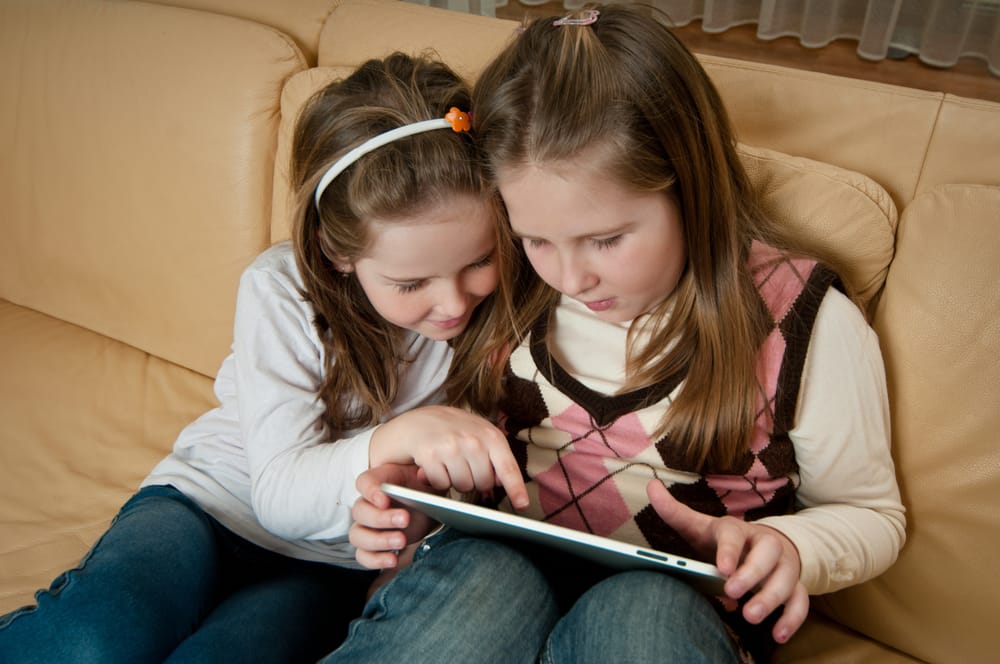Screen Media Time: Source of Conflict or Opportunity?

“But Mum it’s so much fun!”; “It’s only a game”; “I just have to finish.” Sound familiar? This typical chorus of retorts resounds in homes around the world when parents chide their children for being online too long or playing violent video games.
The seductive power of digital media has left parents and teachers conflicted about how best to navigate a wise-path with children.
Feeling overwhelmed, adults often resort to power and threats or passive acceptance to keep the peace. Neither is an opportunity for learning self-discipline, respectfulness or closer relationships.
Parents need to be informed and be proactive: Firstly about the effects of screen media. Secondly to use effective communication to build strong relationships so that they influence children to use screen media wisely.
Research on the effects of screen media
Karen Dill, author of the single-most-cited study on the effects of video-game violence, delivers on how parents and children can move from “the passenger seat to the driver’s seat” in her book, ‘How Fantasy Becomes Reality: Seeing Through Media Influence’.
Dr Aric Sigman in his presentation, ‘The Impact Of Screen Media On Children: A Eurovision For Parliament’ given to the Quality of Childhood Group in the European Parliament, contends: “Screen time has now become a medical issue. Research published in the world’s most reputable medical and scientific journals shows that the sheer amount of time children spend watching TV, DVDs, computers and the internet is linked with significant measurable biological changes in their bodies and brains that may have significant medical consequences.”
What must be noted is that these concerns are based purely on the premature use or overuse of screen media in children whose brains and bodies are not yet fully formed. Dr Sigman lists recommendations for the amount of exposure time depending on age; under three year olds should not be exposed.
Used in moderation however, there are benefits: Watch cognitive neuroscientist Daphne Bavelier’s TED talk. She studies the effect of action games at Switzerland’s University of Geneva and the University of Rochester in New York, and has shown that playing video games can improve eye sight, increase concentration, develop multi-tasking skills and have positive effects on learning and attention span.
So how can you best leverage children’s magnetic attraction to screen media to use it in reasonable amounts so they have educational and healthful long lasting effects?
Become discerning media users and competent citizens together with your child by:
- Establishing respectful relationships.
Children won’t listen to your concerns if you have not listened to them. Build your relationship by getting to know their media likes and dislikes, showing interest in their on-line games without taking over. Share what you enjoy about screen media. Listening and sharing is the foundation of a healthy relationship.Parent example: “My husband plays my boys’ favorite video game WITH them, on the same team of five against other cyberteams. My boys have voiced that they are so lucky and that the other boys think they are so cool that their father plays too. Even I have expressed interest and they are delighted to explain some of the terms to me. Then when they are playing and I make a comment on their player or strategy, the other team members who can hear me, giggle in delight and awe. It really is a chance to become closer because my boys feel accepted, rather than demonized.”What not to do: “During these five player games, everyone is privy to what goes on in other households. According to my oldest son, his good friend (15 years old) has been yelled at and criticized for a “full thirty minutes, no joke!” and been forced to quit his game because his mother “decided he had to help them choose a family movie to watch.” (My husband confirmed this.) Not only was his friend embarrassed in front of others, but there was little chance he was going to enjoy that ‘family’ movie.” - Be a role model.
a.) Role model self-discipline in the use of your own screen time. Do not have the TV on as background noise.
b.) Role model respectful, effective communication skills. Complete Parent Effectiveness Training. Have eye-to-eye conversations. - Regular family fun time.
Brainstorm alternative ideas together – sports, a picnic, board games, cooking. - Meet individual needs in a variety of ways.
Support children to brainstorm other ways than screen media to meet their individual needs for significance, belonging, fun, freedom, self-competence. Young children often cry if they are asked to finish a screen game. Acknowledge their upset and need. Help them choose an alternative.Parent example – “My three year old often cried when asked to finish playing a game on the i-pad. I now prepare her a few minutes before hand and what we will do next to help her transition. She might still cry but now I active listen her need and say, ‘You really wanted to keep playing. You were having so much fun. It’s time for a new activity so you can still have fun and your brain and body can do different things.’ I show her alternatives to select from.” - Provide unstructured play time– especially important for the young child’s developing brain – without electronic media.
Children need opportunity to create and have physical release. Children need time to use their bodies, their sensory self and time for inner reflection. - Develop self-discipline.
Encourage children to draw up a plan that balances their free time, their homework time, their physical needs time, with a range of options. - Become discerning media consumers.
Have discussions at a time when there is no problem and a time that suits you both about: online safety; gender and racial stereotyping; social identity and self-image; pornography and sexual predators then discuss healthy sexuality; cyber-bullying and the importance of assertiveness; narcissistic ‘look at me’ trends inherent with social media. - Use media to send positive messages to your child.
- Share values and concerns respectfully when there is no problem – their ears will be more open to hearing your ideas.
Become a consultant who influences by sharing observed concerns, facts and research, rather than controlling using threats and nagging. Discuss and listen to their perspective. - Use assertive communication skills when you have a problem with your child’s behavior.
Use ‘I-messages’ rather than threats or judgmental ‘you-messages’ eg “I am concerned that you are playing longer on your games than the time you had agreed and I’m concerned you will run out of time for your homework” rather than, “If you don’t stop playing you won’t be going to the movies with your friends”. Listen to your child then reassert your concerns. - Problem solve conflict.
Use conflict as an opportunity to resolve it the P.E.T. ‘no-lose’ way. (http://www.gordontraining.com/)
- Identify your needs and listen to your child to help identify her needs. Your child might identify her need for fun, or his need to complete a level once started. Perhaps he has miscalculated how long he needed on a particular level.
- Brainstorm mutually acceptable solutions to meet those needs so she is not up late finishing homework e.g. start the game earlier; choose games that don’t take so long on weekdays when there is homework etc.
- Problem solving about solutions without first identifying needs is the surest way to continue conflicts. Children who are invested in coming up with solutions to their needs and others are more likely to follow through.
‘No-lose’ example when children brainstormed with parents: “The boys finish all their homework on weeknights before playing one game, which lasts from 20-50 minutes. If there is no time because of extra-curriculars, they won’t play if it interferes with their bedtime. On the weekends, they have more flexibility and are encouraged to use their judgment. One Saturday this spring, we were out of the house from 8:30am-6:00 with other activities and one teenage son was left alone. I called to check in once and (with some effort) did not nag or mention video games at all. As soon as we got home, he bounded up to me and proudly announced without prompting that he had only played two hours of his game because he had broken up his time with various homework assignments. That accomplishment in self-discipline was fully his!”
What not to do: Some years ago I was visiting a home when the mother informed me that she had once again banned her teenager from using the computer for a week because she had been online chatting too much. Imagine the potential for resentment, possible retaliation, an ‘I’ll get back at you’ attitude, or telling lies by going to a friend’s house and going online there. How will this teen ever learn self-discipline if she has always had discipline imposed? I wondered what would happen when the teen leaves home to attend university with no parent to control.
Digital media amplifies good and bad. The rise in the last 10 years coincides with a decline in empathy. On the other hand some games show how to get healthy and express creativity; and heroic activities in virtual reality make you more helpful in the real world.
Writing this blog I became so absorbed I forgot the time. Instead of berating children when they forget, be understanding, be a consultant about the effects of too much, support their problem-solving how to remember time limits.
Your role is clear. Use digital media with children as an opportunity for learning about life.




